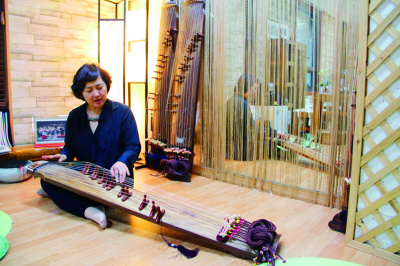
“I cannot fully feel the musical emotions if the surroundings are too desolate,” professor Kwak Eun-ah (’85, Korean Music) said, when asked about the uniqueness of her office. “I decorated my office in a traditional Korean manner in order to grasp the composure Korean classical scholars contained when they enjoyed traditional Korean music.”
Professor Kwak (Korean Music) and her ties with gayageum began at about age 10, when she participated in “Little Angels,” a traditional Korean art troupe composed of children. Although she had learned to play other instruments from the experience, Kwak’s main instrument is gayageum and it still remains as her utmost passion.
“I like gayageum the most because it is a feminine instrument that is thought to be the most representative Korean instrument,” Kwak said. “Also, gayageum is very similar to the human voice, so it expresses the various human emotions very well.”
However, over the course of learning and practicing the instrument, Kwak faced some difficulties due to the nature of Korean traditional music that requires age and experience.
“Unlike Western music, where young and energetic musicians shine and excel, traditional Korean music ripens and is polished with age,” Kwak said. “This is why human cultural assets exist in Korea.”
Kwak’s goal have shifted as well, from valuing concerts themselves to enabling the audience to learn and enjoy together. Wishing to approach the audience with friendliness and no pretenses, Kwak even took apart her instrument during a small concert to show its composition.
Kwak takes this interaction one step further by participating in “Beautiful Mind Charity,” a philanthropic organization that pursues cultural diplomacy. Traveling abroad quite often to perform, Kwak and her charity concert team promote the excellence of Korean music and harmony between Korean and Western music.
Besides being a gayageum player, Kwak is also a passionate professor and educator. She has had a long, strong fervor for teaching ever since she was a university student, and she has worked hard to achieve her dream of becoming a professor. Kwak says that during her time as a teaching assistant, she was famous among professors for saying that she would even go to Jeju Island to teach. In the end, this brought Kwak her first teaching position when a stranger called Kwak one night and offered her a place in Busan, sure that someone as enthusiastic as Kwak would accept it.
In addition, Kwak connected everything she did as a professor and now enlists various skills she has accumulated to her teaching techniques in order to enhance students’ understanding and develop a close relationship with them.
“Many people mistakenly think that they will start working hard once they become a professor,” Kwak said. “However, you have to do numerous things and develop yourself as a process of being a professor.”
For instance, she would tell herself that she is practicing speaking in front of students or teaching them how to play janggu (a type of Korean traditional drum), when she is actually officiating during events or accompanying someone on janggu. Furthermore, she directly demonstrates musical concepts in class such as pansori, a type of Korean traditional song.
“I don’t want to be separated from the students by the platform, and I try to make students understand the lessons rather than blindly pour in information,” Kwak said.
For Kwak, she hopes for her students to be humane instead of being successful or smart. Consequently, she considers her job as to raise students who are high-class, considerate and confident.
Kwak also sincerely advises Ewha students to develop themselves for their future and to live strong.
“Your time as university students is the best time to build your abilities,” Kwak said. “Don’t waste your time doing meaningless things or trying to earn some money, but rather, study hard, practice a lot and hang out with your professors. In addition, never think that things are so difficult for you because wallowing in self-pity will do you no good. Stay strong and work hard!”
Jang Ji-won
jiwon9402@ewhain.net

